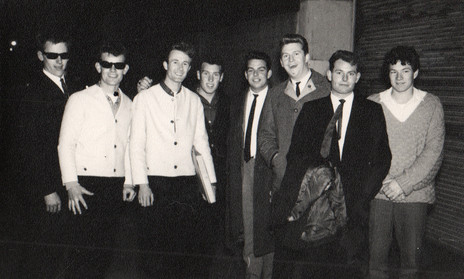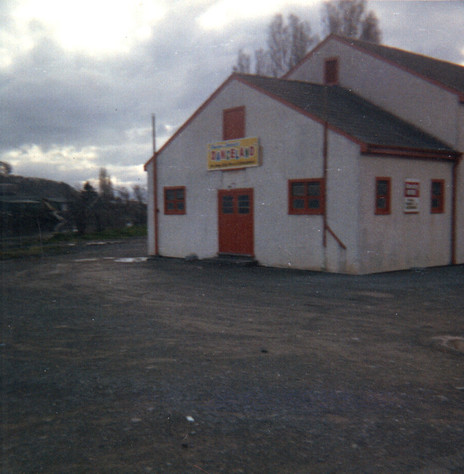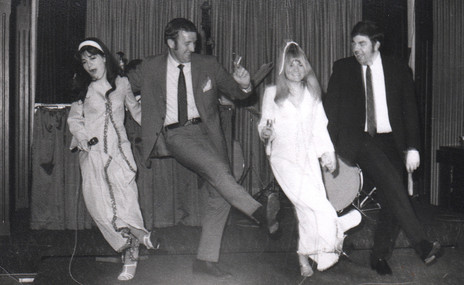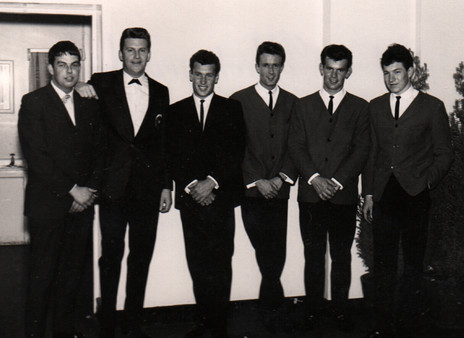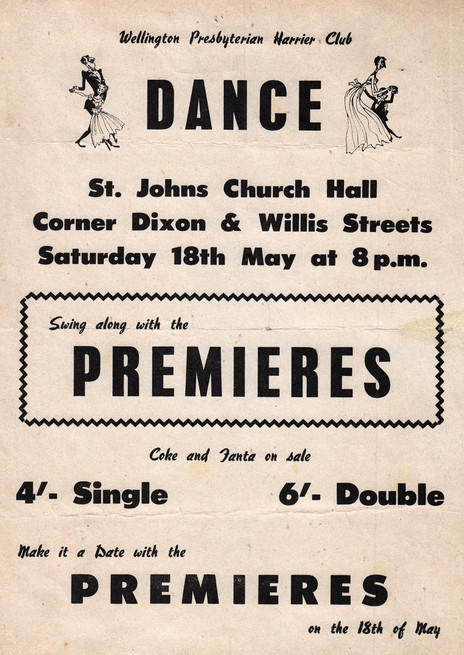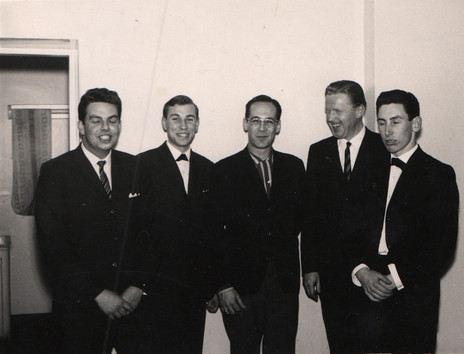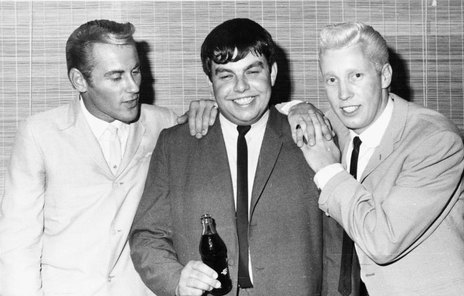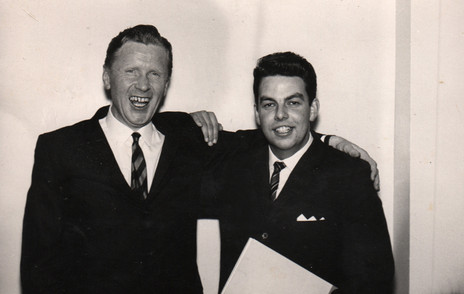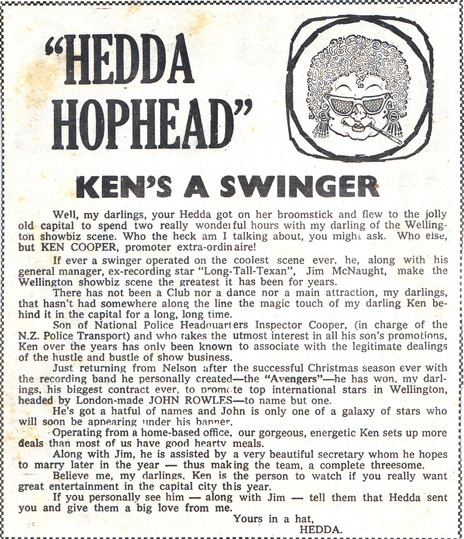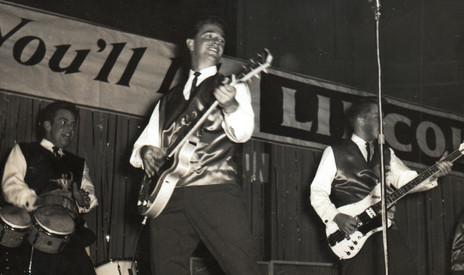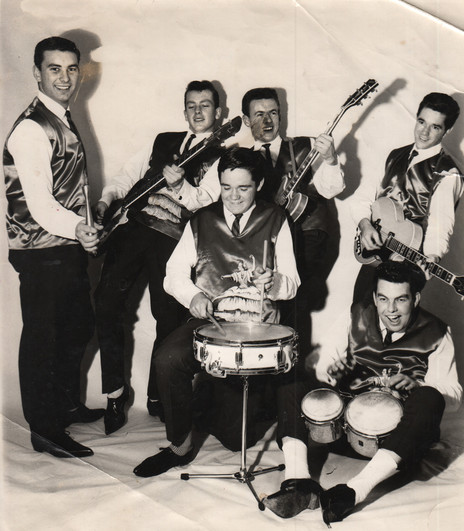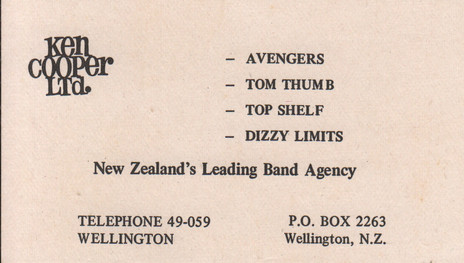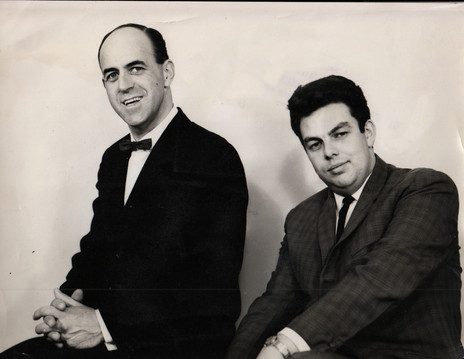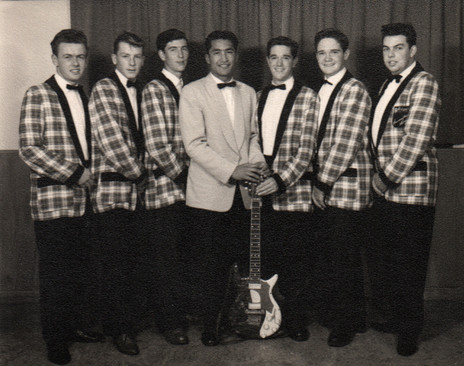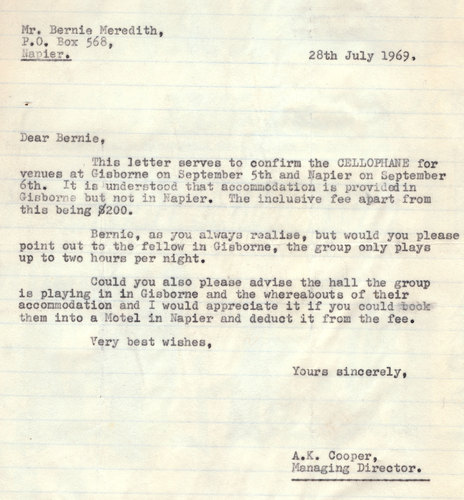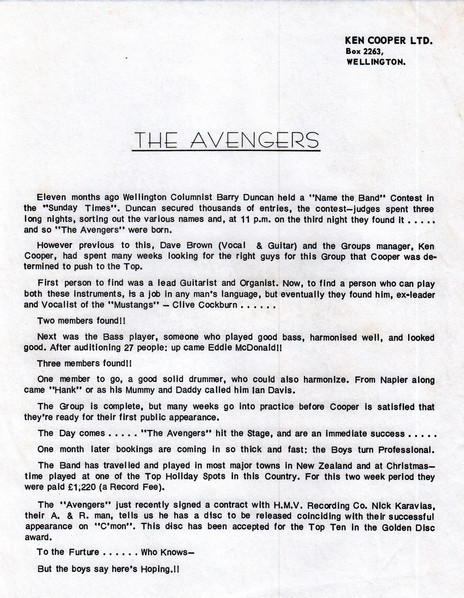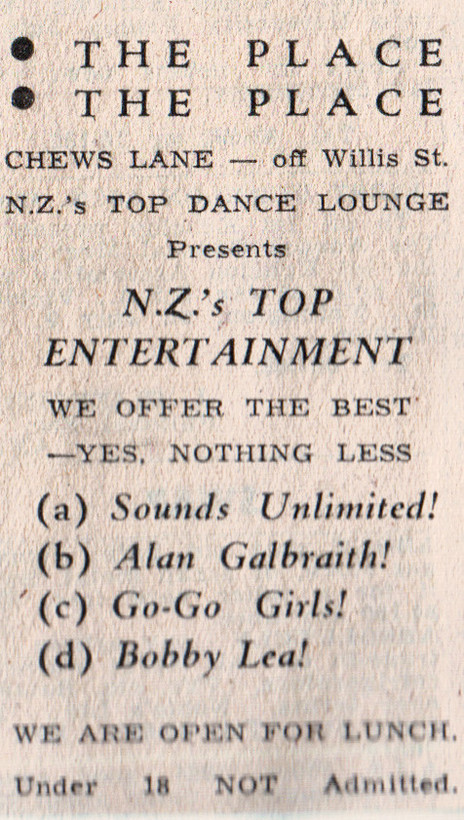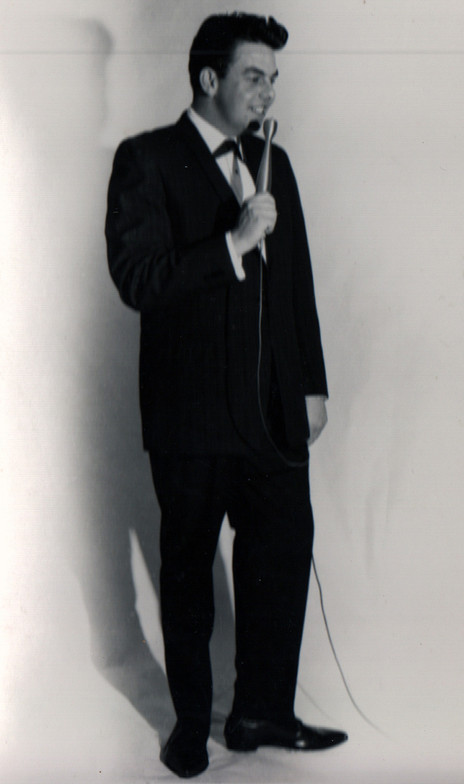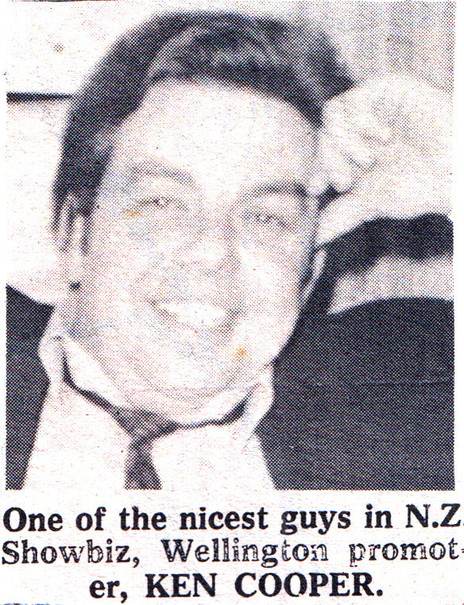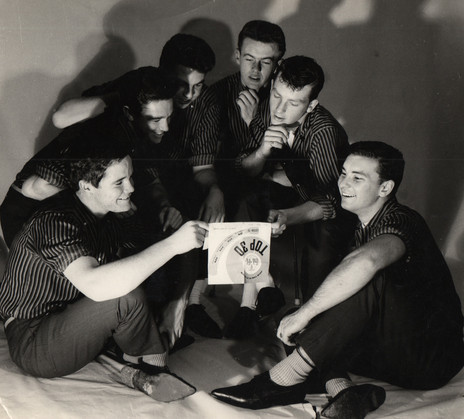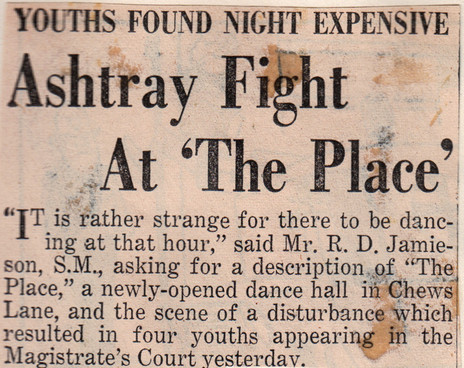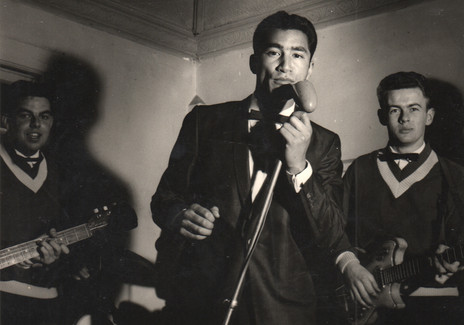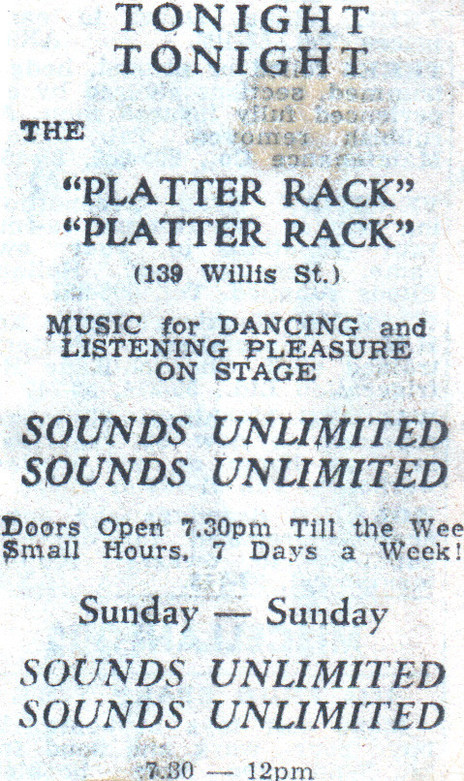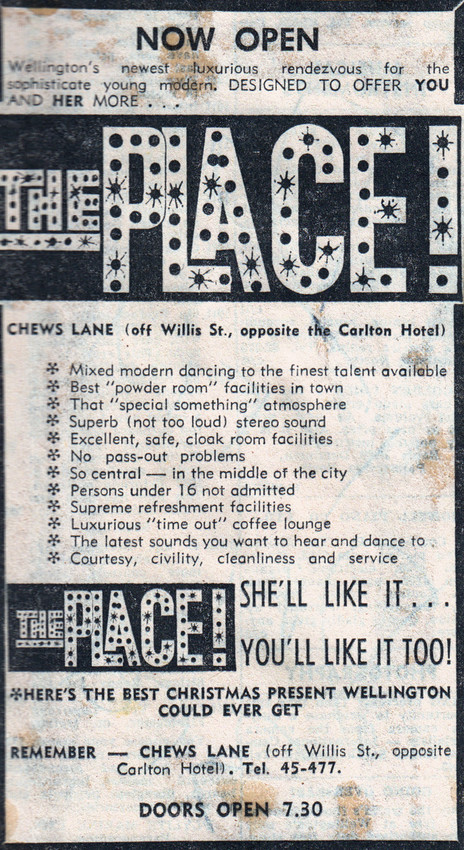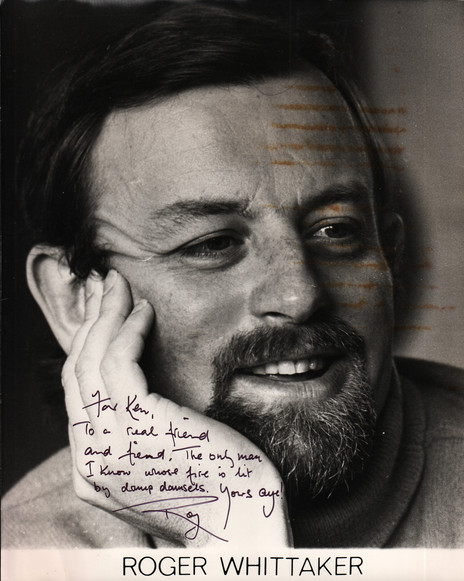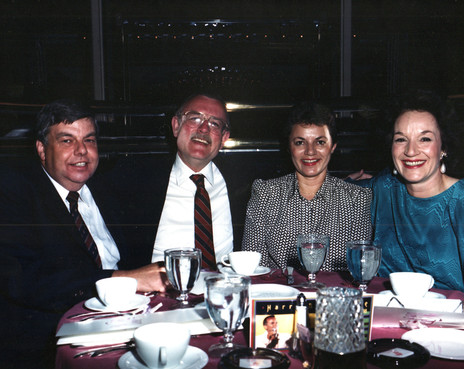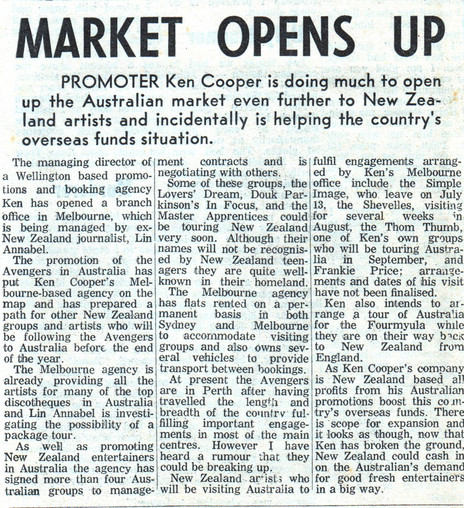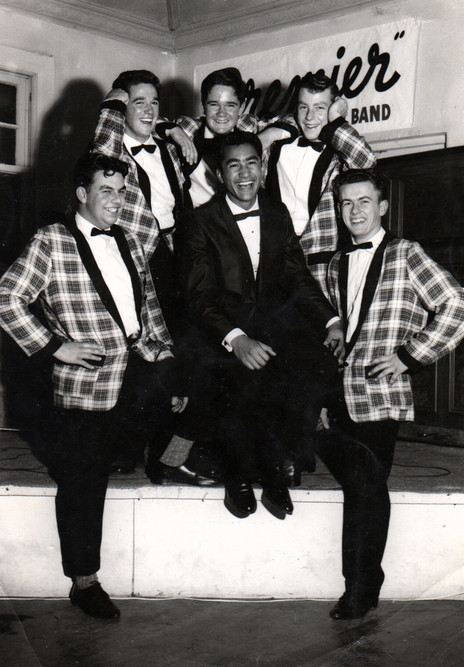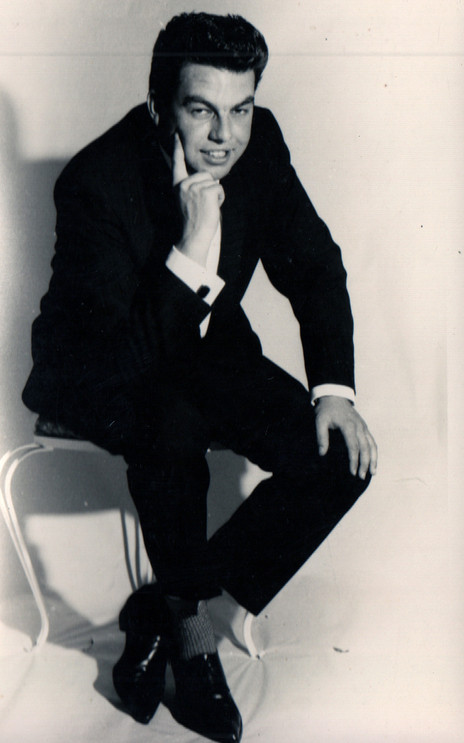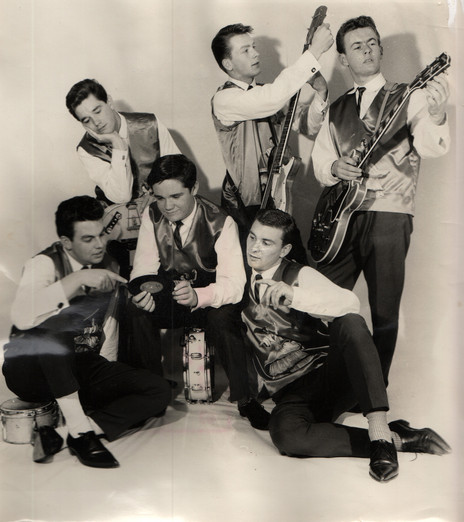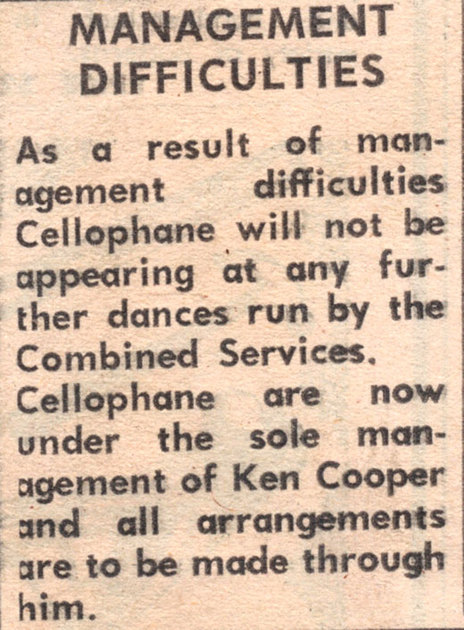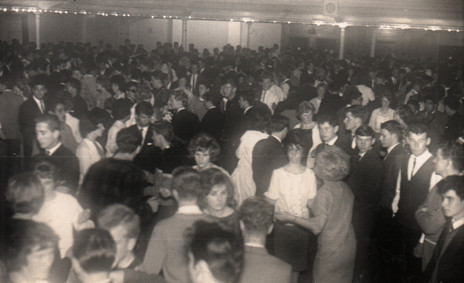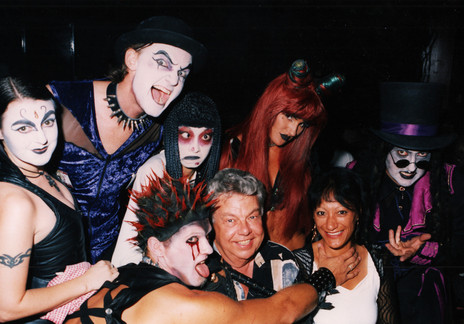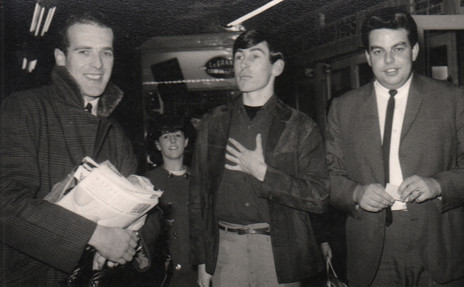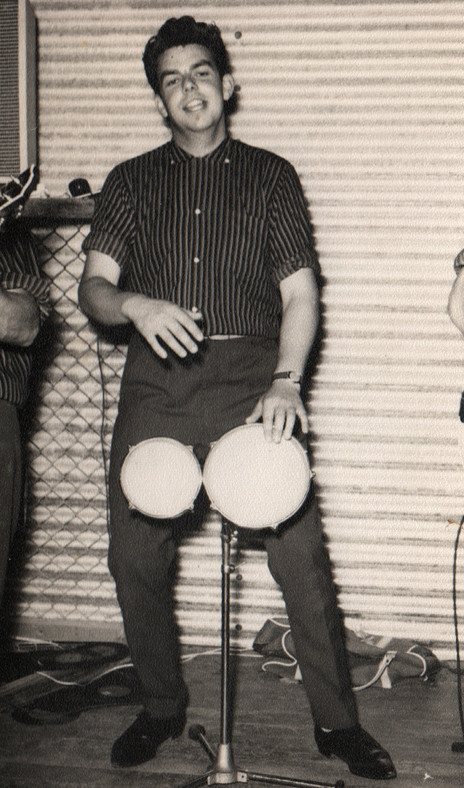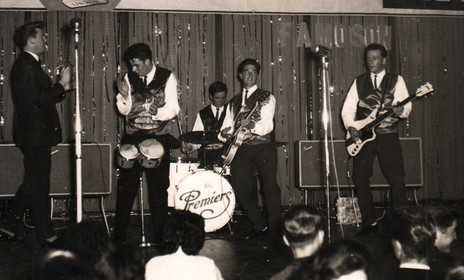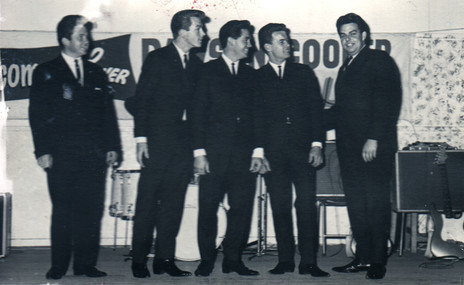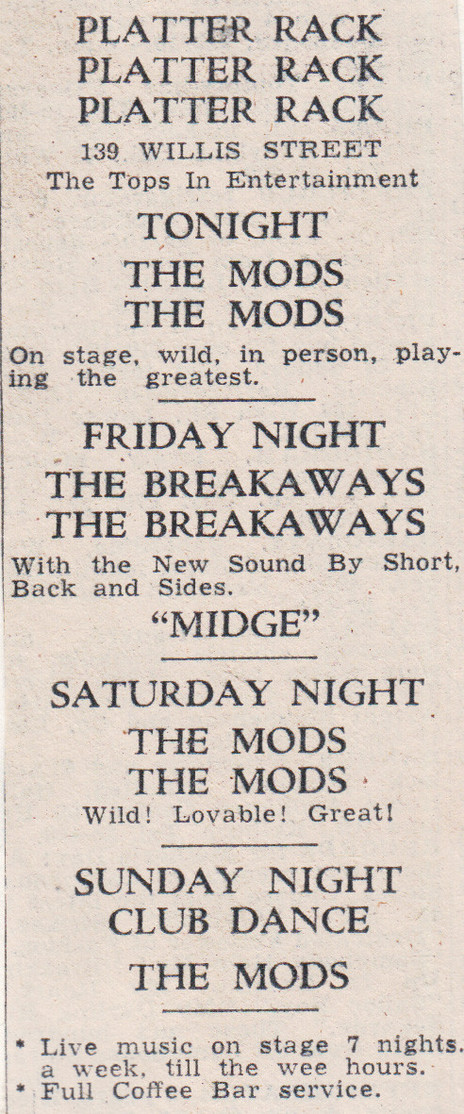Alan Kenneth Cooper was born 18 February 1940, raised in Wellington’s eastern suburbs. In 1957 he and other members of the Miramar Baptist Bible Class formed The Swamp Dwellers to perform at a church fundraising concert.
“Five played,” Cooper recalls. “It was all skiffle, acoustic, two guitars – Mike [Shackleton] and Neil [Harrap] – and we had a tea chest bass [Gary Foothead], vocals and bongos [Graham Beedle] and drums [Brian King].”
They played just four songs, ‘Freight Train’, ‘Maggie May’ and a couple of Lonnie Donegan numbers. Their combination of novelty, teenage enthusiasm and primal musicianship stole the show, impressing one member of the audience, the promoter of a Thursday night dance in nearby Kilbirnie.
Ken Cooper was a budding entrepreneur in the Wellington REgion, then ventured further afield.
That second performance of the same four songs in turn led to Benny Levin adding them to the bill of a jazz concert at the Wellington Town Hall. Audience reaction at all three performances encouraged the group to continue. Extending their repertoire, they began organising their own dances at the Rio Grande in Miramar, and accepting 21sts, weddings, youth clubs, school functions and any other performing opportunities.
After sharing a bill with the more experienced Johnny Deep And The Metro Five, The Swamp Dwellers regularly supported the Levin-based band in the lower North Island and band manager Taua Ranginui became a mentor to the Wellington teens.
The line-up was ever-changing and management for the band’s schedules, rehearsals and transport fell increasingly on Ken Cooper, whose career as a promoter started by default.
The name change came in March 1961, the current line-up heavily influenced by The Shadows; skiffle was out, instrumentals were in. The original Premiers line-up featured Neil Harrap and Mike Shackleton (guitars), bassist Peter Hindmarsh, drummer Andy Shackleton, Ken Cooper on bongos and pianist Doug Harrap.
While The Premiers established themselves as one of Wellington’s top bands in The Shadows’ tradition, Ken Cooper made in-roads as a budding entrepreneur, hiring halls around Wellington and making deals with like-minded promoters in Whanganui, Nelson, Napier and Palmerston North. Later still, these splits with regional promoters would extend to Hamilton, New Plymouth, Nelson, Timaru and Dunedin. In effect, Cooper created his own tour circuit.
There were other partnerships. He founded a booking agency, Entertainment Unlimited, with singer-drummer Jim McNaught, and in 1961 he teamed up with Ian Dawson. Cooper recalls that Dawson and his associate Doug Reid arrived in the capital with grand plans. “They had both worked for [Dunedin promoter] Joe Brown and they had this scheme to take over the Wellington entertainment scene. Ian got involved with the Sorrento, a jazz venue, and they both organised dances – old style, foxtrots and gay gordons. Ian hired the St Francis Hall, near Parliament and Doug ran dances at the Lower Hutt Town Hall.”
The St Francis Hall was a well-established dance venue and Ian Dawson did nothing to change the existing entertainment policy. “I think he was using Don Richardson’s band,” Cooper remembers, “but I talked him into targeting teenagers with rock and roll. We called it Teenarama.”
Teenarama became a Wellington institution, eventually featuring three dances a week – “It grew to around 700 to 800 kids on a Saturday night, 300 to 400 on Friday nights and 200 to 300 on Sunday afternoons.”
The success of Teenarama led to Cooper and Dawson doing a deal with Doug Read, leasing the Lower Hutt Town Hall for weekly dances to dwindling crowds. The Teenarama name was also attached to dances at the Titahi Bay Rugby Club. “It was a bit rough, lots of fights, so we put in an ex-wrestler, Dick Komioski, to manage it.”
In 1962, as Teenarama was taking off, Cooper was still employed at the head office of the McKenzie retail chain. “They’d always been very supportive,” Cooper says. “They gave me time off work and Sir Roy McKenzie regularly lent me his American Ranch Wagon, very flash, to transport bands and equipment. But when I was given the ultimatum, retail or rock and roll, I chose the music; it was better money and more fun.”
Another relationship which proved fruitful was with Des Britten (later Sir Des Britten), then a radio announcer who fronted a radio show, The Coca-Cola Hi-Five Club, and presented Coca-Cola-sponsored dances, not just in Wellington but nationwide. The concept’s popularity was immense and Cooper began promoting occasional Hi-Five Club dances at the Wellington Town Hall, attracting crowds of over 2000.
Cooper’s next business partner was the NZ music heavyweight Phil Warren.
The top Wellington bands played Teenarama, particularly The Premiers (still managed by Cooper) and The Librettos (managed by Dawson). In 1964, convinced that his meal ticket lay with The Librettos, Dawson crossed the Tasman with the band. Cooper’s next business partner was the NZ music heavyweight Phil Warren. They’d had prior dealings, exchanging bands between Auckland and Wellington. Ken Cooper ran the Wellington office of Phil Warren's Auckland-based booking and management agencies Prestige Promotions and Fullers, then the nation's biggest agencies, for the rest of the decade.
By 1966 patronage at teenage dances in hired halls was waning. Cooper and Warren responded with Wellington’s first purpose-built teenage nightclub, The Place, in Chews Lane, off Willis Street. It was a 50-50 partnership (Cooper’s father covering his son’s half of the costs). The building actually housed two businesses: the other was the Montmartre Coffee Lounge, a daytime venture that was incorporated into The Place for four nights a week. The Montmartre was open for the day via one entrance off Willis Street, and the James Bond themed The Place had another. At night The Montmartre was used for The Place overflow and to sell refreshments.
“It was a major renovation,” Cooper says. “Phil sent down his nightclub designer, who’d been responsible for Phil’s other nightclubs, and it took about six months to complete. The building was totally gutted and refurbished.”
One of the tradesmen during the renovation was Dave Brown, guitarist with The Wayfarers. He and Cooper decided to handpick a resident band suitable for the prestigious venue Cooper aspired to. Guitarist-organist Clive Cockburn was coaxed from The Mustangs, bassist Hank Davis came from Hawke’s Bay band The Epics, and drummer Eddie McDonald from The Strangers.
As it turned out, The Avengers was never resident band at The Place – only Sounds Unlimited, enticed from Palmerston North, and featuring Alan Galbraith, can claim a residency at the venue. Cooper had The Avengers, with a string of Top 10 singles, touring almost continuously from Whangarei to Dunedin. Ken Cooper would manage The Avengers throughout their career, working closely with His Master's Voice, their label, to create a carefully cultivated teen fanbase that placed them at the top of their game and made them into a nationwide household name. A professionally run fan club ensured that their records were well supported by votes in the local charts and the Loxene Golden Disc.
Cooper was associated with other bands from the era – The Layabouts, Sounds Unlimited, Tom Thumb and Whanganui’s Top Shelf, to name four – and out-of-town acts to play The Place included Chants R&B, The La De Da’s and Max Merritt’s Meteors.
A second club was The Platter Rack in upper Willis Street.
Cooper and Warren sold The Place / Montmartre lease in 1968 but the following year the new owners contracted Cooper as manager and he soon bought back the lease, in partnership with his good friend and sometimes rival, promoter Tom McDonald.
McDonald had recently opened a new club on Mt. Victoria. He was aiming for an upmarket clientele but Oliver’s, on the inner city’s edge, was in the wrong part of town. At Cooper’s suggestion, it was relocated to the Chews Lane premises where they refurbished the old The Place. To kick off with great fanfare, the duo booked an international act, English trio The Peddlers which they imported directly from the UK.
In early 1969 Ken Cooper promoted the first Wellington concert by John Rowles, fresh from his European chart successes.
Cooper tour managed or organised concerts for The Rolling Stones, Jackson Five, Jethro Tull and many others.
Cooper worked a great deal for Phil Warren, tour managing or coordinating concerts for The Rolling Stones, Rod Stewart and The Faces, The Beach Boys, Santana, The Hollies, Jackson Five, Jethro Tull and others. He has toured with John Rowles seven times and he twice tour-managed The Peddlers. It was Peddlers manager Cyril Smith who hooked up Cooper with Roger Whittaker, who Cooper toured three times.
There were other business interests, restaurants and clubs, one-off concerts and occasional tours. He co-promoted (with Stewart Macpherson) the 1978 Rocky Horror Show and in 1979 he went into partnership with Arthur Williams (Jr); Williams & Cooper promoted national tours by The Boomtown Rats, UB40, Mi-Sex and The Swingers.
In 1982 Cooper’s experience and industry connections paid dividends when he was invited to tour manage all of Roger Whittaker’s performances. Ken Cooper’s role as a major player in the NZ music industry had come to a close. Basing himself in Australia for tax purposes, over the next decade he toured the globe, 30 days on, 30 days off, year in, year out, 100 concerts a year around the world.
“Some people think I made a lot of money back in the 60s and 70s,” he says, “I made a good living but I didn’t make a fortune. The serious money came when I moved offshore.”
When the Whittaker contract came to a close, Cooper managed three restaurants on Australia’s Gold Coast before successfully applying for General Manager at the swanky Okawa Bay Lake Resort, a position he held for 11 years. Situated on the shores of Lake Rotoiti near Rotorua, it was here that he cemented his friendship with Sir Howard Morrison. When his tenure at Okawa Bay came to a close he and Morrison pursued a business opportunity that they would both regret.
The venture was the Sheraton hotel being constructed for the government in Rarotonga by a “Mafia building company”. The Cook Islands government, with a lack of band funding withdrew from the $50 million project and it was eventually shelved, leaving the New Zealand pair out of pocket and nowhere to turn for compensation.
“Howard and I were greedy,” Cooper says. “We thought we saw a big quid. It cost Howard money too but it cost me more. It cost me all my money, all those American dollars from the Whittaker years. However, at least I didn't go bankrupt."
Now semi-retired on the Kapiti Coast, Ken Cooper still keeps his hand in, organising events and tours for the Rotary Clubs and Dame Malvina Major and the odd John Rowles concert.
--
Read The Ken Cooper archives part 1 here
Read The Ken Cooper archives part 2 here
